Search Results for Tag: Jens Tank
DLR hypoxia study: All symptoms disappeared after 30 hours
“We were the mice for five weeks,” says Nancy Hansen describing the time she and Ralf Dujmovits – as reported – spent in a hypoxia chamber at the German Aerospace Center (DLR) in Cologne half a year ago. The goal of the study was to find out whether, under certain circumstances, extreme hypoxia can lead to a strengthening of the heart in humans – as previously found out in two experiments with mice in the USA. After an acclimatization phase of around two weeks, the climbers had spent 16 days at a simulated altitude of 6,700 meters or higher, including four days at an oxygen content of only eight percent, which corresponds to 7,112 meters. “I suffered quite a lot,” admits Nancy. “But it was a big privilege to be part of the study.” Ralf is also still impressed by the experience: “I was hard on the edge. To be honest, I wouldn’t do it again. I underestimated the whole thing.” Last week the couple was in Cologne again – for one of several follow-up examinations. The first preliminary results of the study are now available.
![]() read more
read more
“Hypoxia expedition” successfully completed
And suddenly the call came from space: “Here is Alex”. At first Ralf Dujmovits did not know who was talking at the other end of the telephone line: “Alex? Then I suddenly recognized the voice I had heard two days earlier during the broadcast of the rocket launch.” Alexander Gerst inquired from the International Space Station (ISS) about the condition of the German climber and his Canadian partner Nancy Hansen in the hypoxia chamber of the German Aerospace Center (DLR) in Cologne. “It sounded like he was sitting next door.” For a quarter of an hour, Ralf, the first and so far only German climber to have scaled all 14 eight-thousanders, spoke to “Astro Alex”, the first German astronaut to take command of the ISS. “He was very interested in our experience in the lab. That was great.” Of course, Nancy talked to Gerst too. For both climbers it was a “real highlight”, says the 49-year-old Canadian.
![]() read more
read more
Dujmovits: “We are in good hands here”
The doors have closed behind Ralf Dujmovits and Nancy Hansen. The so far only German climber who has scaled all 14 eight-thousanders and his Canadian partner moved in a 110-square-meter hypoxia chamber of the German Aerospace Center (DLR) in Cologne on Tuesday. As reported, the two mountaineers are participating in a study conducted by DLR in cooperation with the University of Texas to investigate whether extreme hypoxia can also have a positive side effect for human beings. US researchers from Texas found in two experiments with mice that heart muscle cells devided when the animals were exposed for two weeks to oxygen deficiency corresponding to conditions at 7,000 m. In mice which had previously been triggered myocardial infarctions, cardiac function improved after two weeks of hypoxia.
Medical control around the clock
Ralf and Nancy, both healthy, are the subjects of the pilot study. They are to stay in the hypoxia chamber for about a month. In the first few weeks, acclimatization as on a Himalayan expedition is simulated. The oxygen percentage in the air will be gradually lowered and temporarily increased only twice in between – as if the two climbers would descend again to breathe thicker air. The last two weeks, the 56-year-old German and the 49-year-old Canadian are to spend in a simulated height of 7,000 meters. The experiment can be stopped at any time in case serious problems arise. A DLR research team monitors Dujmovits’ and Hansen’s state of health around the clock. The daily schedule includes heart and lung function checks, blood and urine tests, fitness checks and so-called “cognition tests”, which check the reaction and perception of the subjects.
Yesterday, I visited the two climbers in their new “home”. That was possible on Wednesday for the last time without breathing mask. After more than half hour in a simulated altitude of about 3,700 meters, I felt a little bit dizzy. I preferred to do the interview with Ralf subsequently in thick air, by phone.
Ralf, you can not get out, there is no daylight, and the oxygen is lowered. That does not sound like a holiday apartment.
![]() read more
read more



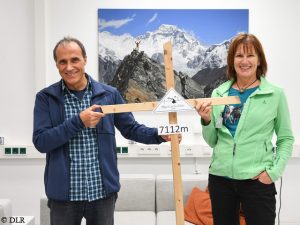

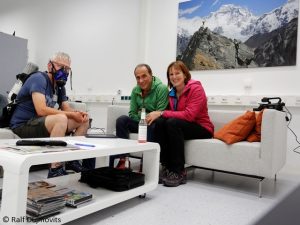
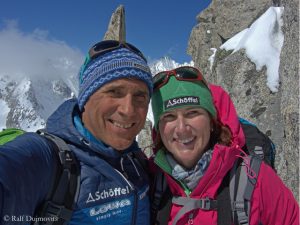
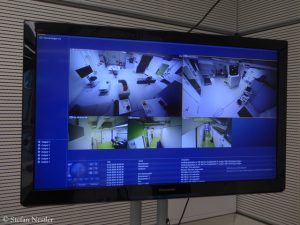
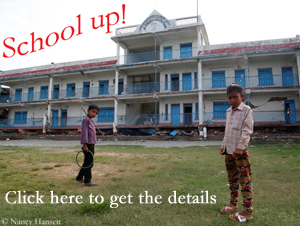
Feedback